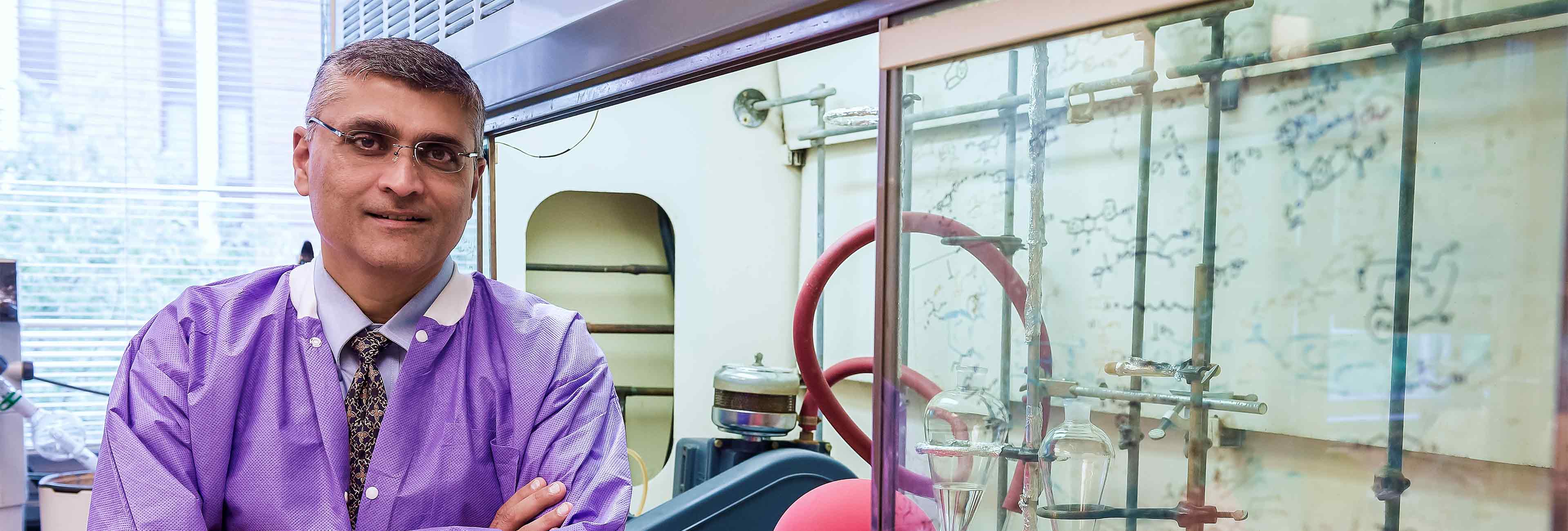Graduate Programs
Thank you for your interest in the graduate programs in medicinal chemistry at Virginia Commonwealth University. We are proud of our diverse multicultural and international community and hope you will consider joining us. Please fill out the online application by following the links on the admissions page and pay particular attention to the overview and program information below, which should help you organize and focus your application.
The Discipline
Medicinal chemistry, an amalgamation of chemistry and the life sciences, is a multidisciplinary field that applies chemical (i.e., synthetic analytical, theoretical, and/or physical chemistry) principles to investigations of biologically active substances that include therapeutically useful drugs, natural products, toxins, and drugs of abuse. Investigations may be focused on identification of biological mechanisms of action, rational drug design and synthesis, metabolism studies, identification of pharmacological tools, or the development of techniques necessary to perform such studies. The discipline requires an understanding of both the chemical and biological processes involved; thus, in addition to a solid background in chemistry, the medicinal chemist is required to be versed in biological sciences such as biochemistry, pharmacology, toxicology, molecular biology, enzyme mechanisms, receptor theory and/or neurochemistry, depending upon their particular interests.
Program Overview
Students in our program receive advanced training in drug design and discovery including organic chemistry, modern medicinal chemistry, biochemistry, computational chemistry and pharmacology.
The special strengths of our department are in the areas of:
- cardiovascular drugs (hemoglobin and allosteric modifiers of hemoglobin, sickle cell disease, coagulation factors, glycosaminoglycans)
- drugs acting on the central nervous system (serotonin and serotonin-based agents, opioid receptor agents and abuse mitigation, Alzheimer's disease)
- new antimicrobial targets
- natural product biosynthesis (macrocyclic antibiotics)
- anti-cancer agents (oncogenic signaling pathways, cancer epigenetics, receptor tyrosine and cytosolic serine/threonine kinases)
- biomolecule structure elucidation (X-ray crystallography, NMR, cryo-Electron Microscopy, modeling and prediction)
- theoretical methods of predicting drug structure and activity (hydropathic interaction analyses, structure-based drug design, virtual library screening)
A large number of technologies at the forefront of drug discovery are being discovered and implemented in our department including computer-aided drug discovery, high throughput screening, microarray analysis, biophysical thermodynamic analysis, library synthesis, natural products modification and analysis, etc.
Degree Offerings
The VCU Bulletin is the official source for academic course and program information.
Master of Science and Doctor of Philosophy in Pharmaceutical Sciences (Major in Medicinal Chemistry)
The Department of Medicinal Chemistry in the School of Pharmacy offers programs leading to the Master of Science and the Doctor of Philosophy in pharmaceutical sciences. These programs provide the preparation and research experience for academic, governmental and industrial careers. Graduate degrees in pharmaceutical sciences do not provide eligibility for licensure as a pharmacist. Persons interested in programs leading to licensure as a pharmacist, or in advanced professional programs in pharmacy, are referred to the School of Pharmacy section of the Undergraduate and Professional Programs Bulletin. Students may elect to pursue a joint Pharm.D./Ph.D. program. Additional information is available from the VCU Bulletins for the M.S./M.P.S. in Medicinal Chemistry and the Ph.D. in Medicinal Chemistry.
Curriculum and Resources
In addition to research, the curriculum consists of two general components: core courses and elective courses. All graduate students, doctoral and master's students alike, are required to take core courses that include certain offerings in medicinal chemistry, drug design, advanced organic chemistry, molecular graphics, biochemistry, pharmacology, and laboratory safety. Specific courses may be recommended based on placement exams administered during the first week of enrollment. Graduate students are also required to present one (master's candidates) or two (doctoral candidates) non-thesis seminar(s) and a final seminar on the research. Depending upon their interests, and in consultation with their chosen dissertation advisor, students select from a variety of elective courses such that their graduate program can be specifically tailored to their future research or career goals. Doctoral students are required to pass a series of cumulative examinations and, upon successfully doing so, become eligible to take an oral comprehensive examination based on an original (i.e., non-thesis) research proposal. Most graduate students begin their research during their first year, and are encouraged to present the results of the research, in oral and poster format, at various local, state, and other scientific meetings. Most advanced graduate students also participate in laboratory and classroom teaching, and some as tutors, to enhance their teaching proficiency and presentation technique. A well prepared student, depending upon the nature of their research, should be able to complete all degree requirements in less than two and a half years for a master's degree or within about four and a half years for a doctoral degree.
The department consists of 10 faculty members, 24 graduate students, and 15 postdoctoral fellows and visiting scientists at any given time. Faculty members are encouraged to be active in the pursuit of external funding, as grant/contract support provides the basis of much of the department's resources. The department, primarily through the School of Pharmacy, offers several teaching and research assistantships to qualified students. Research resources include state-of-the-art molecular modeling facilities, synthetic organic chemistry laboratories, X-ray crystallographic equipment, and access to high-field nuclear magnetic resonance spectrometers. The department's research interests are closely interwoven with the Institute for Structural Biology and Drug Development, to which many of the department faculty belong.
